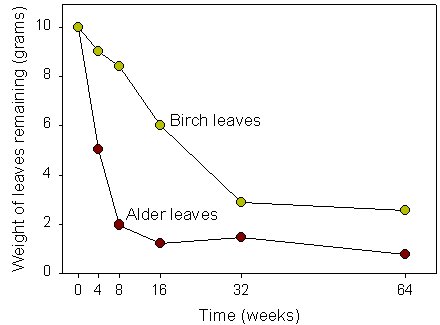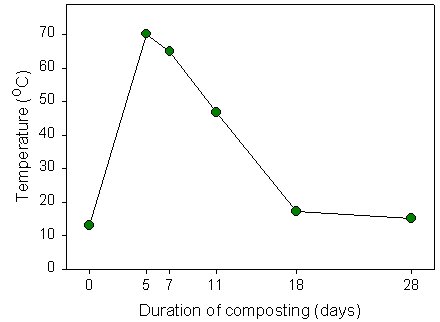- Home Page
- Composting
- Decomposition
Aims
Feedstock and Compost Mixes
Compost Production and Application - Land Restoration
- Quarry Sites
Urban Brownfield Sites
Mine Sites
Colliery Sites - Restoration results
- Quarry site - Blaenau Ffestiniog
Urban Brownfield site - Shotton
Mine site - Greece
Colliery site - Woolley Colliery - Dissemination and Publications
- Forthcoming Events
Previous Events
Open Days
TWIRLS Newsletters
Scientific Publications
Media Archive
Best Practice - Manuals and Tools - Information Services
- Best Practice - Manuals and Tools
- Our Staff

TWIRLS: Treating Waste for Restoring Land Sustainability
Decomposition
Composting Menu
Decomposition and composting
Decomposition
Decomposition is the process by which structures and molecules contained in organic matter are broken down into smaller, simpler compounds. Mineralisation describes the complete decomposition of compounds into their component elements. Decomposition is mediated by the activities of decomposer organisms (principally bacteria and fungi) and is regulated by the chemical composition of the material being decomposed and environmental conditions such as temperature, moisture and nutrient availability.

Figure 1. Decomposition of alder leaves and birch leaves under natural conditions. Alder leaves break down more quickly than birch leaves, perhaps because they contain more nitrogen; a nutrient essential for microorganisms.
Composting
During the first few weeks of composting, large numbers of
microorganisms consume low and medium molecular weight ‘labile’
compounds, such as sugars and amino acids, contained in the organic matter
being composted. During this feeding frenzy so much energy is released
by their break-down that the temperature of the compost increases to 55
degrees centigrade or above (Figure 2).
It is this temperature increase that distinguishes composting from natural
decomposition of organic matter.

Figure 2. Temperature change when the biodegradable fraction of household rubbish is composted together with green waste collected from municipal parks and gardens. The high temperatures kill harmful microorganisms such as E. coli that may be found in rubbish, but it is not enough to kill the thermophillic microorganisms doing the composting.
When the supply of labile compounds is diminished, the temperature of
the compost decreases and other groups of microorganisms, including basidiomycete
fungi (such as white rot fungi) begin to slowly break down high molecular
weight compounds, such as lignin and celluloses. The texture, colour and
biochemical characteristics of the finished compost are determined largely
by these complex compounds, which will themselves decompose, but over
a much longer timescale.
Many detailed explanations of decomposition and composting are available (see links). Cornell University’s composting site provides particularly good background information on the process of decomposition and the factors that regulate it.

